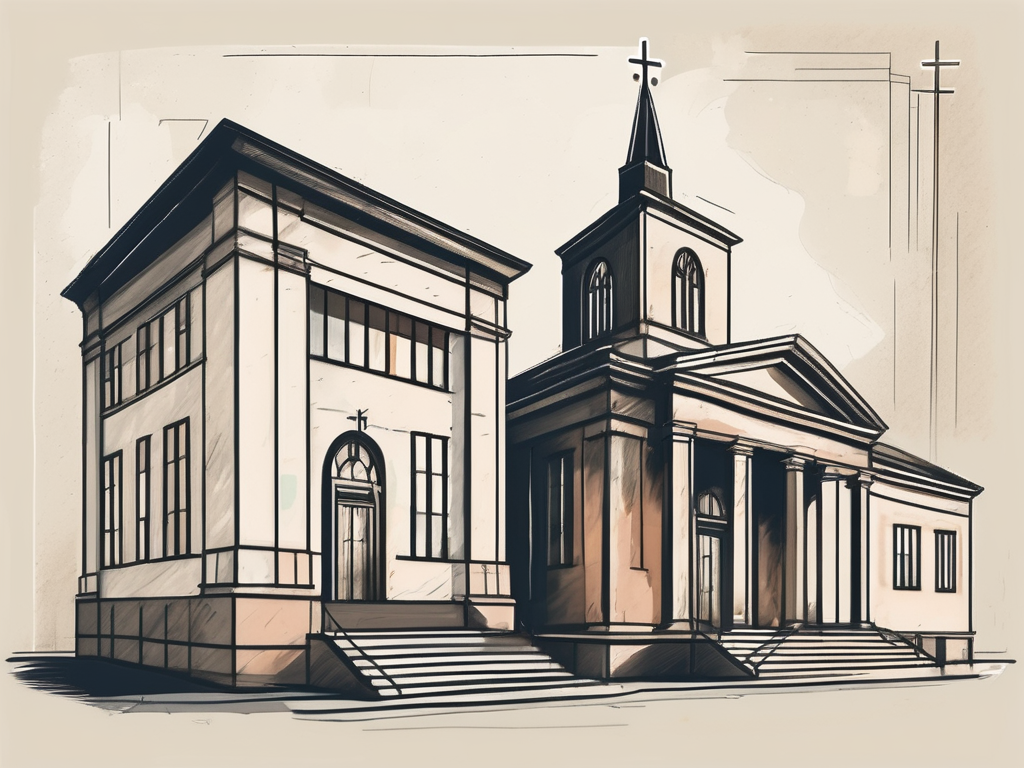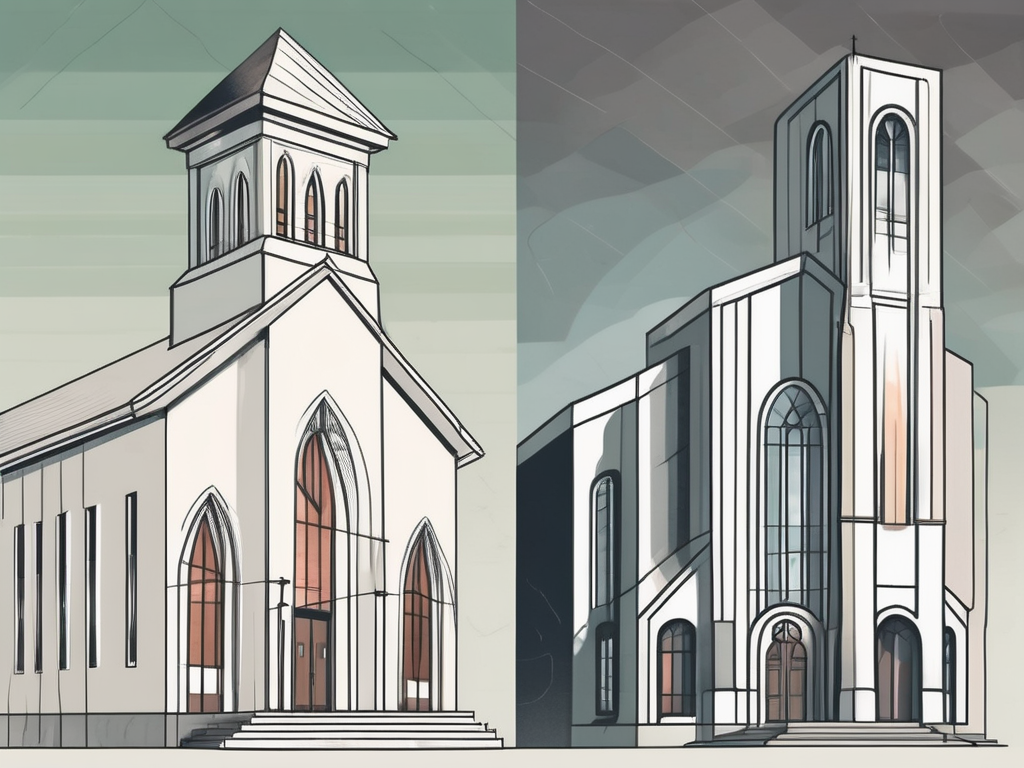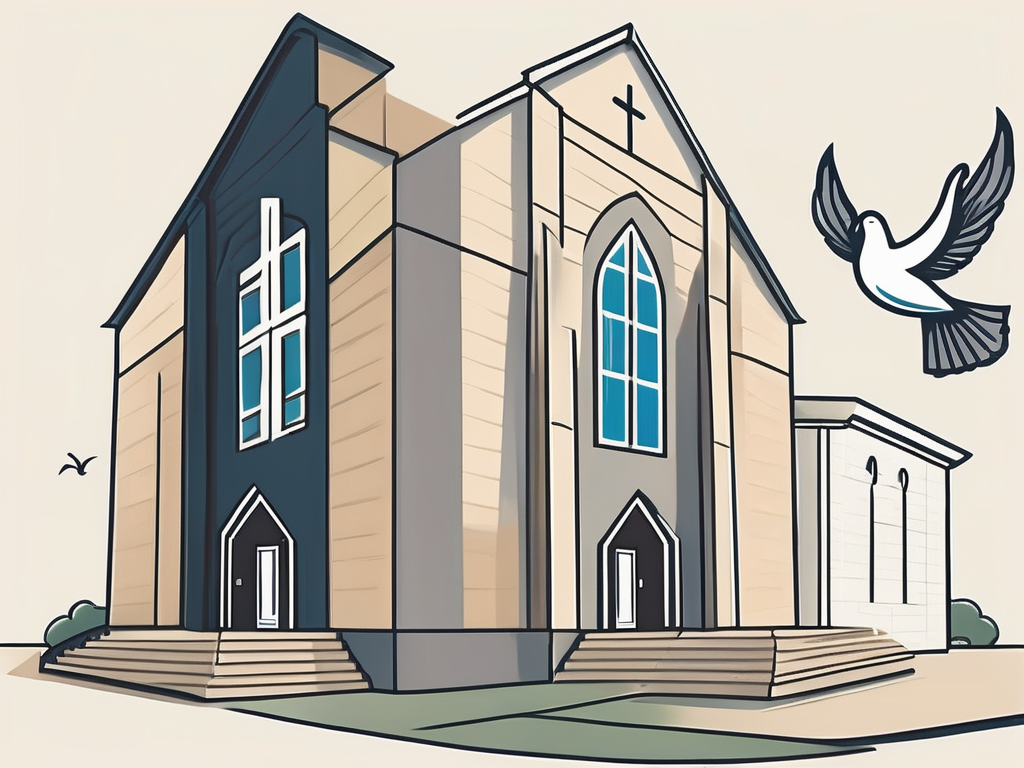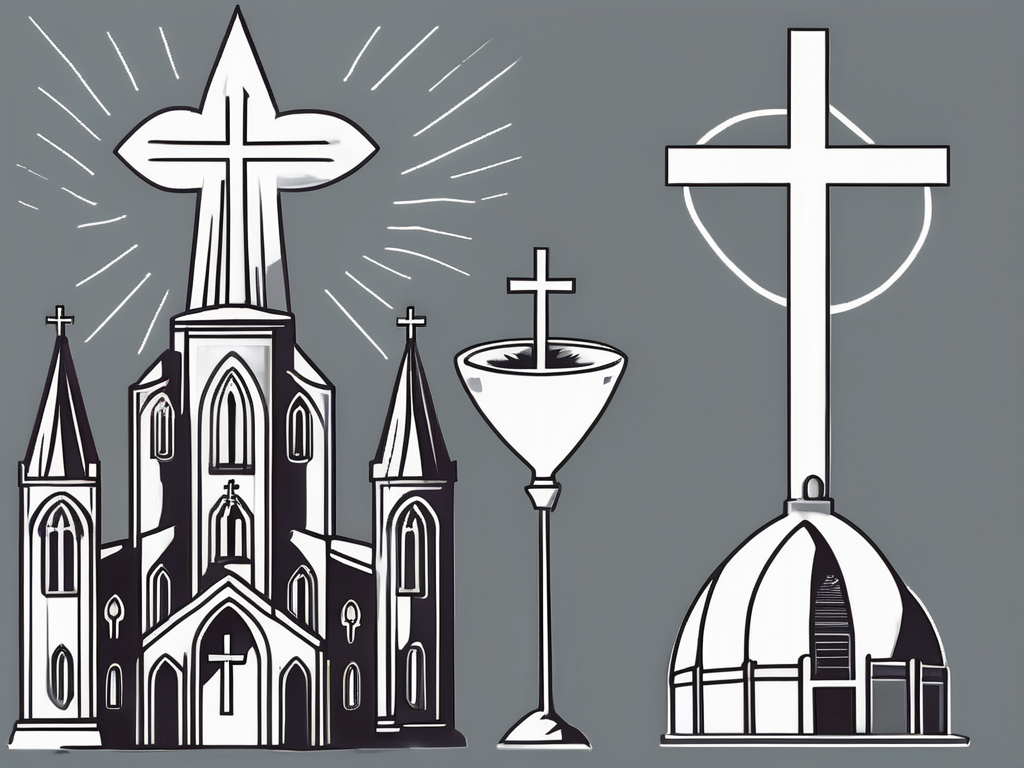When it comes to different Christian denominations, Seventh Day Adventist and Baptist are two prominent groups that have their own unique beliefs and practices. In this article, we will dive into the origins, core beliefs, worship practices, views on the Bible, and perspectives on salvation and the afterlife of both denominations. By understanding the similarities and differences between Seventh Day Adventists and Baptists, we can gain a better appreciation for the diversity within Christianity.
Understanding the Origins of Seventh Day Adventist and Baptist
The Birth of the Seventh Day Adventist Church
The Seventh Day Adventist Church, founded in the early 19th century in the United States, emerged as a result of the teachings of William Miller. Miller, a Baptist preacher, predicted the second coming of Jesus Christ in the 1840s. His prediction gained significant attention and followers, as people eagerly anticipated the fulfillment of this prophecy.
Although Miller’s prophecy did not come true, his followers did not lose hope. Instead, they sought to understand the reasons behind the failed prediction and continued to study the Bible fervently. It was during this time that Ellen G. White, one of Miller’s followers, emerged as a prominent figure in the movement.
White, who claimed to have received visions and messages from God, provided guidance and interpretation of the scriptures to the growing community. Her teachings emphasized the importance of the Sabbath, healthful living, and the imminent return of Jesus. These teachings resonated with many, and gradually, a distinct religious community began to take shape.
The Seventh Day Adventist Church officially formed in 1863, with Ellen G. White playing a crucial role in its establishment. Her writings, known as the “Spirit of Prophecy,” became an integral part of the church’s doctrine and provided guidance for its members.
The Emergence of the Baptist Church
The Baptist Church, on the other hand, has a longer history dating back to the 17th century. The origins of the Baptist movement can be traced to England, where it grew out of the dissenting Puritan tradition.
During the 17th century, England was undergoing significant religious and political changes. The Church of England, which held a dominant position, faced criticism and dissent from various groups. One of these dissenting groups was the Puritans, who sought to purify the Church of England from what they perceived as corrupt practices.
Within the Puritan movement, a subgroup emerged that emphasized the importance of individual faith and the practice of adult baptism through immersion. This group, known as the Baptists, believed that baptism should be reserved for individuals who had made a personal decision to follow Jesus Christ.
The Baptist movement gained momentum and spread across England and eventually to the American colonies. In America, the Baptist Church experienced significant growth and diversification, with various denominations and associations forming based on theological differences and regional influences.
Today, the Baptist Church remains a diverse and influential religious community, with millions of followers worldwide. While there are variations in beliefs and practices among different Baptist denominations, the emphasis on personal faith, salvation through Jesus Christ, and the autonomy of the local church remains central to Baptist theology.
Core Beliefs and Doctrines
When it comes to matters of faith, different religious denominations have their own set of core beliefs and doctrines that guide their practices and shape their worldview. In this discussion, we will explore the fundamental beliefs of Seventh Day Adventists and the key teachings of Baptists.
Fundamental Beliefs of Seventh Day Adventists
Seventh Day Adventists, as a religious group, adhere to a comprehensive set of 28 fundamental beliefs that form the foundation of their faith. These beliefs encompass a wide range of theological concepts and principles that shape their understanding of God, salvation, and the purpose of human existence.
One of the key tenets held by Seventh Day Adventists is the belief in the Trinity. They affirm the existence of one God who exists in three persons: the Father, the Son (Jesus Christ), and the Holy Spirit. This belief in the Triune nature of God is central to their understanding of divine unity and the nature of God’s relationship with humanity.
Another essential belief for Seventh Day Adventists is the authority of the Bible as the word of God. They view the Scriptures as the inspired and infallible revelation of God’s will and guidance for humanity. The Bible serves as the ultimate source of truth and the basis for their faith and practice.
Seventh Day Adventists also place a strong emphasis on Sabbath observance. They believe that the seventh-day Sabbath, which falls on Saturday, is a sacred day of rest and worship ordained by God. They view Sabbath observance as a sign of loyalty and obedience to God’s commandments.
Furthermore, Seventh Day Adventists believe in the existence of a heavenly sanctuary. They interpret the biblical concept of the sanctuary as a representation of God’s dwelling place and His redemptive work in human history. This belief underpins their understanding of Jesus Christ’s role as the High Priest in the heavenly sanctuary, mediating on behalf of humanity.
Lastly, Seventh Day Adventists strongly affirm the second coming of Jesus Christ. They believe that Jesus will return to Earth in the future to establish His eternal kingdom and bring about the ultimate fulfillment of God’s plan for humanity. This belief in the second coming serves as a source of hope and anticipation for Seventh Day Adventists.
It is also worth noting that Seventh Day Adventists place a significant emphasis on health and well-being. They believe in the holistic nature of individuals, recognizing the interconnectedness of physical, mental, and spiritual aspects of human existence. As such, they promote a healthful lifestyle that includes a vegetarian diet, regular exercise, and abstaining from harmful substances.
Key Teachings of Baptists
Baptists, another prominent Christian denomination, hold certain core doctrines that distinguish their beliefs and practices. These teachings shape their understanding of God, salvation, and the nature of the church.
Like Seventh Day Adventists, Baptists affirm the belief in the Trinity. They recognize God as one being who exists in three distinct persons: the Father, the Son (Jesus Christ), and the Holy Spirit. This understanding of the Triune nature of God is foundational to their theology.
Another essential teaching for Baptists is the authority of the Bible. They regard the Scriptures as the inspired and authoritative word of God, providing guidance and instructions for faith and practice. Baptists emphasize the importance of personal Bible study and the individual’s responsibility to interpret the Scriptures under the guidance of the Holy Spirit.
Baptists also emphasize salvation through faith in Jesus Christ alone. They believe that individuals are saved by God’s grace through faith in Jesus’ sacrificial death and resurrection. This belief in salvation by faith alone distinguishes Baptists from other Christian traditions that may place additional emphasis on good works or sacraments.
In terms of church governance, Baptists uphold the principle of the autonomy of the local church. They believe that each local congregation is self-governing and independent, with the freedom to make decisions regarding matters of faith and practice. This autonomy allows for a decentralized structure and encourages congregational involvement and participation.
Baptists practice two ordinances: believer’s baptism and the Lord’s Supper. Believer’s baptism, also known as adult baptism, is seen as a public declaration of faith and a symbol of one’s identification with Jesus’ death, burial, and resurrection. The Lord’s Supper, or communion, is a symbolic act of remembrance of Jesus’ sacrifice and is typically observed regularly within Baptist worship services.
Furthermore, Baptists emphasize the priesthood of all believers. This means that every believer has direct access to God without the need for intermediaries. They believe in the spiritual equality of all believers and encourage active participation and involvement of all members in the life and ministry of the church.
In conclusion, both Seventh Day Adventists and Baptists hold to a distinct set of core beliefs and doctrines that shape their faith and practice. While there are similarities in their affirmation of the Trinity and the authority of the Bible, there are also unique teachings that differentiate these two Christian denominations. Understanding these core beliefs is essential for appreciating the rich diversity within the Christian faith.
Worship Practices and Rituals
Seventh Day Adventist Worship Style
Seventh Day Adventists typically worship on Saturdays, honoring the Sabbath as a holy day. Their worship services often include singing hymns, prayer, Bible readings, and a sermon. They also place a strong emphasis on education and frequently have Sabbath School programs for both children and adults.
During their worship services, Seventh Day Adventists create an atmosphere of reverence and reflection. The congregation gathers in a beautifully adorned sanctuary, filled with natural light streaming through stained glass windows. The sound of melodic hymns fills the air as worshippers join their voices together in harmonious praise. The songs chosen for worship are carefully selected to convey meaningful messages and inspire spiritual growth.
Prayer is an integral part of Seventh Day Adventist worship. The congregation joins together in heartfelt prayers, expressing their gratitude, seeking guidance, and interceding for the needs of others. These moments of communal prayer foster a sense of unity and connection among the worshippers, as they lift their voices as one to the heavens.
Central to the Seventh Day Adventist worship experience is the reading of the Bible. The sacred scriptures are revered as the inspired word of God, and passages are carefully chosen to guide and inspire the congregation. As the verses are read aloud, the worshippers listen attentively, seeking wisdom and understanding in the timeless words of scripture.
The sermon holds a significant place in Seventh Day Adventist worship. A trained pastor or speaker delivers a message that is grounded in biblical teachings and relevant to the challenges and joys of everyday life. The sermon serves as a source of spiritual nourishment, providing guidance, encouragement, and inspiration to the congregation.
In addition to the main worship service, Seventh Day Adventists prioritize education and spiritual growth. Sabbath School programs are offered for both children and adults, providing opportunities for in-depth study of the Bible and the teachings of the Seventh Day Adventist faith. These programs foster a sense of community and provide a platform for discussion and exploration of spiritual topics.
Baptist Worship Traditions
Baptists, on the other hand, usually gather for worship on Sundays, considering it the Lord’s Day. Baptist worship services commonly involve congregational singing, prayers, Bible readings, and preaching. They place a high value on preaching and see it as a means of conveying God’s message to the congregation. Additionally, Baptists may hold various ceremonies such as baptisms and communion.
When Baptists gather for worship, they create an environment that encourages active participation and engagement. The congregation assembles in a warm and inviting sanctuary, adorned with symbols of faith and adorned with beautiful artwork. The atmosphere is filled with a sense of anticipation as the worshippers prepare their hearts and minds to encounter God.
Music plays a vital role in Baptist worship. The congregation joins together in singing hymns, accompanied by a talented choir or a skilled musician playing the organ or piano. The melodies and lyrics of the hymns are carefully chosen to evoke deep emotions and stir the spirit, allowing worshippers to express their love and devotion to God through music.
Prayer is an essential component of Baptist worship. The congregation engages in heartfelt prayers, offering praises, seeking forgiveness, and interceding for the needs of others. These moments of prayer create a sacred space where individuals can connect with God on a personal level and experience His presence in their lives.
Baptist worship services place a significant emphasis on the reading of the Bible. The congregation listens attentively as selected passages are read aloud, allowing the timeless words of scripture to penetrate their hearts and minds. The Bible is seen as the ultimate authority and guide for faith and practice, and its teachings are central to the Baptist worship experience.
The sermon holds a prominent position in Baptist worship. A skilled preacher delivers a message that is rooted in biblical truth and relevant to the lives of the congregation. The sermon serves as a source of spiritual nourishment, challenging and inspiring the worshippers to live out their faith in practical ways.
In addition to the regular elements of worship, Baptists may also engage in various ceremonies such as baptisms and communion. Baptism symbolizes the believer’s identification with Christ’s death, burial, and resurrection, while communion commemorates the sacrifice of Jesus Christ through the sharing of bread and wine. These ceremonies hold deep spiritual significance and serve as powerful reminders of the central tenets of the Baptist faith.
The Role of the Bible in Both Denominations
Bible Interpretation in the Seventh Day Adventist Church
Seventh Day Adventists regard the Bible as the ultimate authority for faith and practice. They employ a principle called “present truth,” which means they interpret the Bible based on its relevance to the present time. They also consider the writings of Ellen G. White, one of the church’s founders, as inspired and helpful in understanding biblical truths.
The Baptist Perspective on the Bible
Baptists firmly believe in the supreme authority of the Bible. They espouse the principle of biblical literalism, interpreting the text in its plain, straightforward meaning. Baptists rely heavily on personal reading and study of the Bible, encouraging believers to develop their own understanding of God’s word. They value a personal relationship with God through the Scriptures.
Views on Salvation and Afterlife
Seventh Day Adventist Beliefs about Salvation and Afterlife
Seventh Day Adventists believe in salvation by grace, which means that individuals are saved through God’s unmerited favor. They emphasize the significance of personal faith in Jesus Christ and His role as the mediator. Adventists also believe in the possibility of losing salvation through persistent unbelief or willful rejection of God. Regarding the afterlife, they hold the belief in the resurrection and the eternal reward for the righteous.
Baptist Understanding of Salvation and Afterlife
Baptists share a similar belief in salvation by grace through faith in Jesus Christ. They emphasize the individual’s personal relationship with God and the necessity of repentance and conversion. Baptists affirm the eternal security of believers, meaning that once saved, a person cannot lose their salvation. They also believe in the resurrection and the eternal destinies of both the saved and the unsaved.
In conclusion, the Seventh Day Adventist Church and the Baptist Church may have distinct origins, beliefs, worship practices, views on the Bible, and perspectives on salvation and the afterlife. However, both denominations are united in their faith in Jesus Christ and strive to serve God according to their understanding of His teachings. Embracing the diversity within Christianity can lead to a deeper appreciation of God’s presence and work in the world.












